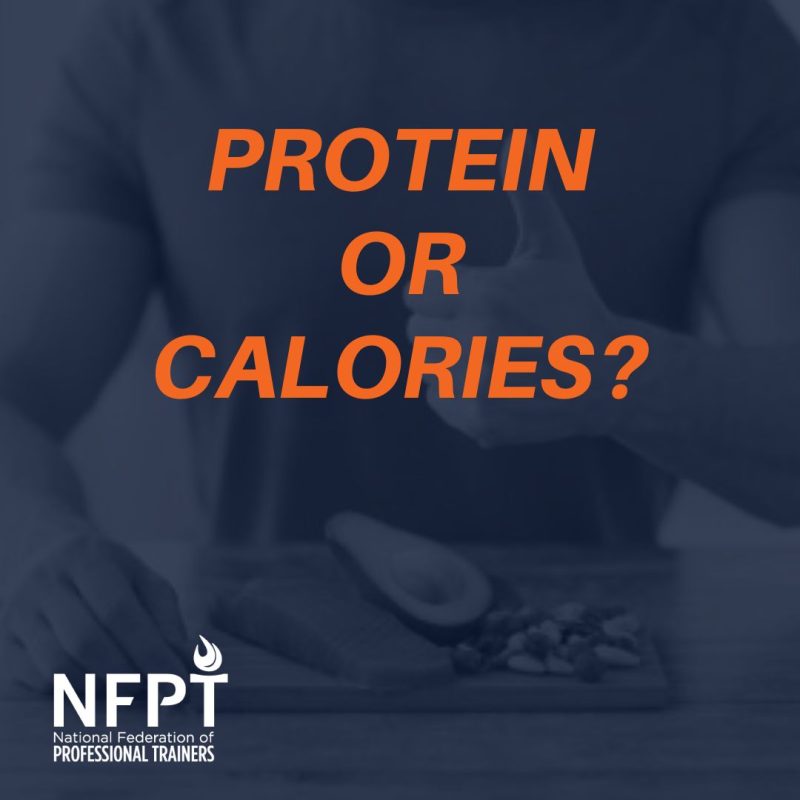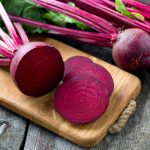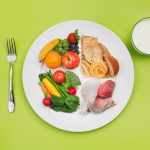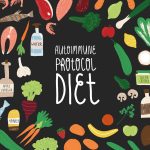
There seem to be conflicting opinions about what’s most important to grow muscles: the intake of protein or total calories. Personal trainers should know that the answer is complex and shouldn’t point to one or the other, but the correct combination of both.
The process of building muscle is referred to as muscle protein synthesis. According to Jessica Spendlove, Sports Dietitian and nutrition consultant, “There are two important stages in muscle protein synthesis — the breakdown phase, which occurs when you train…and then the growth or synthesis phase, which is caused by ingesting food, in particular, protein-based foods.”
Muscle strength can be acquired simply by engaging in resistance exercises. However, weight training comprises only part of the equation. Successful muscle mass gains require placing the body in an energy surplus, a mindful and prudent total caloric increase.
Eating Protein for Results
Chloe McLeod, a Sports Dietitian from Australia, suggests the following: “I usually look at around an extra 500 calories per day, so there’s an excess amount of energy available for the muscles to grow.” If you have been certified through the NFPT, then this is a point you already understand.
McLeod further points out the need to supply these extra calories both before and after exercise. “Fueling the weight training session beforehand but also having the energy availability right after…allows the muscles to recover and growth to occur.”
Spendlove talks about taking a broad view of the dietary component. “The overall process of determining how much food is required to build muscle mass generally involves comparing an individual’s current eating patterns (which includes what, when and how much they are currently eating) with their current training regime, and then looking at what is happening with their body mass and composition.”
The key macronutrient involved in muscle growth is protein. If calories are not being restricted, scientists believe that serious bodybuilders should aim for 1.2-2.0 g protein per kg of body weight (or .8 to 1 gram/lb of body weight) per day.

Clarifying Total Calories
When debating the importance of consuming protein or total calories for building lean muscle tissue, most professionals advise prioritizing calories first and protein second.
While both adequate protein and calories are vital in order to maximize muscle hypertrophy, it may still be possible to build muscle with adequate calories and somewhat lower protein intake than recommended compared to meal plans favoring higher protein consumption but fewer calories.
Calories are the body’s primary source of energy. Through evolution, the human body has become adept at avoiding death during a famine or caloric scarcity. In order to remain functional in such situations, the body lowers its metabolic rate, thereby utilizing fewer calories to sustain itself. Over time, the body will begin to shrink, further lessening the caloric demand necessary for survival.
If you ask bodybuilders if they prioritize protein or total calories, they’ll likely tell you protein. In the presence of adequate protein but reduced total calories, most individuals will lose weight, but the resulting loss comes from fat tissue, while muscle mass is spared.
As time goes on, a calorie-restricted diet will only net mediocre hypertrophy gains, since both energy and recovery material will be lacking. Once the body attains a certain level of extreme leanness, a caloric deficit will render it virtually impossible to build additional muscle. In the absence of sufficient fats, the body must prioritize life functions over hypertrophy.
Eating By The Clock
The timing of protein ingestion is also key in cultivating hypertrophy, as well as the type of protein consumed. In general, protein supplementation pre- and post-workout increases physical performance, strength, hypertrophy, and also facilitates recovery.
Recent research indicates that consuming a generous serving of protein immediately before bedtime may yield significant increases in strength and muscular hypertrophy. Bodies are unique, both in terms of resistance training protocols and metabolism, and therefore individual protein needs will differ. However, in anticipation of a heavy strength training morning (such as working quads or other large muscle groups), such protein and complex carbohydrate needs overnight are significant, in order to create ample glycogen stores/recovery material.
In an attempt to further clarify nutrient timing, researchers compared three different protein dosing scenarios in an effort to determine which regimen resulted in the maximum sustained muscle protein synthesis, or MPS. Each protocol called for a total consumption of 80 g of protein per day. The options were 20 grams of protein every 3 hours for 12 hours, 10 grams of protein every 1.5 hours for 12 hours, or 40 grams of protein every 6 hours for 12 hours.
The 20-gram dose every 3 hours was shown to yield the best results. This is exactly in line with a typical bodybuilder plan of 4 meals equally spaced throughout the day. Of course, the addition of significant resistance training alongside such a protein dosing protocol will accelerate the accompanying gains in lean muscle tissue.
Consider the Building Blocks of Protein
Specific mass gains differ based upon one’s choice of protein type. Studies have demonstrated that the ingestion of fat-free milk post-workout is highly effective at promoting lean body mass gains, strength, and a reduction in overall body fat.
Specifically, the leucine content of a protein source has a large impact on protein synthesis. Consumption of 3–4 g of leucine following an intense weightlifting session promotes maximum protein synthesis. A combination of a fast-acting simple carbohydrate source, such as glucose in the form of honey or fresh fruit, should ideally be consumed in tandem with the protein, as leucine cannot modulate protein synthesis as effectively without a slight insulin spike.
To facilitate an increase in muscle mass without the addition of pure fat mass, men typically aim for a caloric surplus of 500 calories/day; 300 extra calories/day is suggested for women. Increasing intake by dividing the calories over three meals is more achievable than adding an extra meal. This can be achieved by adding an extra egg at breakfast, 3 ounces of chicken at the midday meal, and ¼ cup of mixed nuts with ½ cup of 2% cottage cheese as a snack.
By experimenting with food swaps, most individuals eventually settle upon a routine that easily and comfortably affords them the calories necessary for muscle growth.
Consuming Cautiously
For every bit of good news, medical research also provides the downsides, and protein consumption is no exception. Dr. Gail Butterfield, Director of Nutrition Studies at the Palo Alto Veterans’ Administration Medical Center, says consuming more than 30% of the day’s total calories from protein could have deleterious effects.
A diet containing too much protein, especially while not increasing intensity of exercise, may place other bodily systems under stress. In addition, a 1992 study published in the Journal of the American Geriatrics Society asserts that this practice will have an undesirable aesthetic outcome as well: too much protein will accumulate equal amounts of muscle mass and fat, not ideal for the professional athlete.
The assumption that a majority of the protein we consume is immediately available to the muscle tissues might be slightly misguided. A more accurate scenario is rooted in the often-overlooked science behind macronutrient breakdown.
For every 20 grams of protein ingested during a meal, the cells of the small intestine and the liver (among the most metabolically active tissues in the body) consume about 10 grams of that ingested dose. Of the remaining available 10 grams, approximately 8 grams will be used by other tissues for energy, to produce urea, and for synthesis of neurotransmitters and enzymes.
Under normal conditions, only about two grams of what remains are available for muscle protein synthesis. While this seems like a paltry amount, consider this: if only one gram of protein per meal gets utilized for muscle synthesis, and an athlete consumes four meals per day, the total adds up to a yearly net gain of just over three pounds. This breakdown clearly illustrates why a gain of 4-5 lbs. of muscle mass per year represents tremendous growth for drug-free bodybuilders.
The Final Word on Protein or Total Calories
Whether your client base includes avid strength trainers, marathon runners, or just average exercisers, a balanced diet rich in fruits, vegetables, whole grains, lean meats, fish, and complex carbohydrates is what most sports nutritionists recommend. Quibbling over whether protein or total calories is most impactful can sometimes overcomplicate what is implicitly understood when adopting a balanced diet.
While respecting the boundaries of a personal trainer’s scope of practice, you can always feel comfortable extolling the virtues of a clean, healthy meal plan.
References:
- https://www.ncbi.nlm.nih.gov/pmc/articles/PMC5852756/
- https://8fit.com/fitness/meal-plan-muscle-gain-much-protein-really-need/
- https://www.livestrong.com/article/306475-can-you-build-muscle-without-eating-a-lot-of-protein/
- https://www.otpbooks.com/mike-prevost-protein-muscle-hypertrophy/
- https://www.webmd.com/fitness-exercise/features/will-eating-more-protein-help-your-body-gain-muscle-faster#1
- https://drjohnrusin.com/5-nutritional-methods-for-fat-loss-hypertrophy
- https://www.ncbi.nlm.nih.gov/pmc/articles/PMC3529694/
- https://www.quora.com/What-is-more-important-for-muscle-gains-protein-or-calories-What-if-someone-only-got-his-daily-amount-of-protein-without-the-calories-needed
- https://www.huffingtonpost.com.au/2017/07/30/do-you-need-to-eat-more-to-build-muscle_a_23057004/







